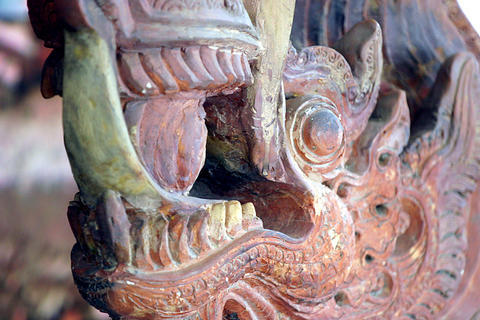Vietnam plans to restore the ruins of an ancient imperial city in central Hanoi dating back to the 7th century with help from Japan and the UN cultural organization, heritage officials say.
Work is expected to start next year to preserve the old citadel ahead of the capital's 1,000th birthday in 2010 and would strengthen Hanoi's chances of having its historic cultural heart declared a World Heritage site in future.
The remains of the ancient citadel and relics from five feudal dynasties were first discovered in 2002 during excavation work to build a new national assembly in the center of the capital, putting construction on hold.

PHOTO: AFP
Archeologists discovered millions of priceless artifacts from the city once known as Thang Long (Ascending Dragon), including terracotta figures of dragons and phoenix heads, ceramics, canons, swords and coins.
The find started a dispute between heritage and development forces over what to do with the ruins located in what has been Vietnam's center of political power for most of its history, from ancient times until today.
The 20,000m2 dig shares a city block with the existing Ba Dinh national assembly and is located near the mausoleum of Ho Chi Minh, Vietnam's revolutionary leader and first president.
At one stage, Vietnam's government considered moving the legislature to the outskirts of Hanoi, but it has now decided to build the new assembly on the site of the existing Ba Dinh Hall, adjacent to the ancient city ruins.
Authorities have put on display 17 design models for the new assembly. The exact size of the new building remains unclear, but officials say the development will allow for the adjacent ruins to be saved.
"The government has decided to preserve the area, not to build a national assembly building here," said Bui Minh Tri, secretary of the Thang Long Imperial Citadel site project and deputy director of Vietnam's Institute of Archeology. "We will build a museum or a historical park."
Workers are now excavating palace structures and artifacts in the area, which is shielded by a large plastic roof and closed to the general public, but work is set to be stepped up under the new project.
Japan has offered to provide financial and technical aid to protect and restore the citadel via a Japan-UNESCO (UN Educational, Scientific and Cultural Organization) fund, the state-run An Ninh Thu Do newspaper reported.
"Our goal is to preserve this historical site for the long term, not only for the celebrations of the 1,000th anniversary of Thang Long-Hanoi," said Tran Quang Dung, deputy chief for the National Steering Committee for 1,000 Years of Thang Long-Hanoi, according to the report.
Hanoi became the capital of Vietnam in 1010 under the Ly dynasty. The name Thang Long, or Ascending Dragon, symbolized the desire for independence after a thousand years of Chinese domination, historians say.
The dig has unearthed ancient palace foundations and the remains of the central forbidden city, with ruins dating back 1,300 years to the Chinese Tang dynasty.

POLITICAL PRISONERS VS DEPORTEES: Venezuela’s prosecutor’s office slammed the call by El Salvador’s leader, accusing him of crimes against humanity Salvadoran President Nayib Bukele on Sunday proposed carrying out a prisoner swap with Venezuela, suggesting he would exchange Venezuelan deportees from the US his government has kept imprisoned for what he called “political prisoners” in Venezuela. In a post on X, directed at Venezuelan President Nicolas Maduro, Bukele listed off a number of family members of high-level opposition figures in Venezuela, journalists and activists detained during the South American government’s electoral crackdown last year. “The only reason they are imprisoned is for having opposed you and your electoral fraud,” he wrote to Maduro. “However, I want to propose a humanitarian agreement that

ECONOMIC WORRIES: The ruling PAP faces voters amid concerns that the city-state faces the possibility of a recession and job losses amid Washington’s tariffs Singapore yesterday finalized contestants for its general election on Saturday next week, with the ruling People’s Action Party (PAP) fielding 32 new candidates in the biggest refresh of the party that has ruled the city-state since independence in 1965. The move follows a pledge by Singaporean Prime Minister Lawrence Wong (黃循財), who took office last year and assumed the PAP leadership, to “bring in new blood, new ideas and new energy” to steer the country of 6 million people. His latest shake-up beats that of predecessors Lee Hsien Loong (李顯龍) and Goh Chok Tong (吳作棟), who replaced 24 and 11 politicians respectively

Young women standing idly around a park in Tokyo’s west suggest that a giant statue of Godzilla is not the only attraction for a record number of foreign tourists. Their faces lit by the cold glow of their phones, the women lining Okubo Park are evidence that sex tourism has developed as a dark flipside to the bustling Kabukicho nightlife district. Increasing numbers of foreign men are flocking to the area after seeing videos on social media. One of the women said that the area near Kabukicho, where Godzilla rumbles and belches smoke atop a cinema, has become a “real

Archeologists in Peru on Thursday said they found the 5,000-year-old remains of a noblewoman at the sacred city of Caral, revealing the important role played by women in the oldest center of civilization in the Americas. “What has been discovered corresponds to a woman who apparently had elevated status, an elite woman,” archeologist David Palomino said. The mummy was found in Aspero, a sacred site within the city of Caral that was a garbage dump for more than 30 years until becoming an archeological site in the 1990s. Palomino said the carefully preserved remains, dating to 3,000BC, contained skin, part of the